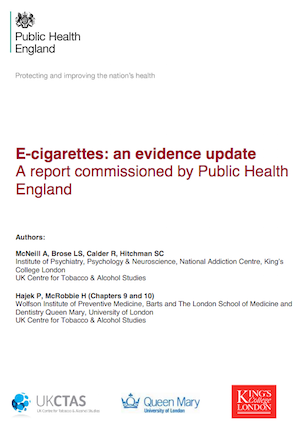Cancer Council Australia's policy on e-cigarettes not "evidence-based and up-to-date"
An investigation has revealed claims that Cancer Council Australia’s policy on e-cigarettes is “evidence-based and up-to-date” to be false and misleading. Detailed comparison of document versions from 2014 and August 2016 have shown no new evidence included in the 117 citations used to support their position to ban e-cigarettes. This is in contrast to major reports released in the UK since 2014 which have found that e-cigs are likely to have public health benefits in harm reduction compared to smoking tobacco.
This has serious implications for Australians as our state and federal governments are making laws based on outdated information.
In 2014, Cancer Council Australia and National Heart Foundation of Australia jointly released a position statement on e-cigarettes, calling for bans on the retail sale, advertising and use of e-cigarettes in smokefree areas. The document, over 7000 words long, argues that such actions are justified until more evidence emerges around the short and long term health effects of their use. The two charities then set about lobbying state governments to implement their policy, with much success.
Internet Archive Reveals False Claims
It’s reasonable to assume that a peak organisation claiming to be evidence-based would attempt to keep their policy up to date. That expectation seems to be validated by the footer attached to each page of the document when downloaded from their website:

With no change history published, we sought a way to find out what new evidence had been added since 2014.

Fortunately, the Internet Archive project’s ‘Wayback Machine’ was able to provide copies of the document dating back to 2014 (example).
Analysis of updates to Cancer Council’s position on e-cigarettes revealed:
- no new evidence was cited since the document was made public in 2014
- some citations dates were changed from 2014 to 2016 despite no changes to their content
The analysis can be viewed here
Important Evidence Missing
The document makes no reference to two groundbreaking reports from 2015 and 2016:
In 2015, Public Health England released E-cigarettes: an evidence update. This expert review of the latest evidence concludes that e-cigarettes are around 95% safer than smoked tobacco and they can help smokers to quit.
In 2016, the Royal College of Physicians released Nicotine without smoke: Tobacco harm reduction. The report concludes that “e-cigarettes are likely to be beneficial to UK public health. Smokers can therefore be reassured and encouraged to use them, and the public can be reassured that e-cigarettes are much safer than smoking”.
The report also addresses many of the concerns raised in Cancer Council’s position statement.
Since e-cigarettes became available in the UK in 2007, their use has been surrounded by medical and public controversy. This new 200-page report examines the science, public policy, regulation and ethics surrounding e-cigarettes and other non-tobacco sources of nicotine, and addresses these controversies and misunderstandings with conclusions based on the latest available evidence:
- E-cigarettes are not a gateway to smoking – in the UK, use of e-cigarettes is limited almost entirely to those who are already using, or have used, tobacco.
- E-cigarettes do not result in normalisation of smoking – there is no evidence that either nicotine replacement therapy (NRT) or e-cigarette use has resulted in renormalisation of smoking. None of these products has to date attracted significant use among adult never-smokers, or demonstrated evidence of significant gateway progression into smoking among young people.
- E-cigarettes and quitting smoking - among smokers, e-cigarette use is likely to lead to quit attempts that would not otherwise have happened, and in a proportion of these to successful cessation. In this way, e-cigarettes can act as a gateway from smoking.
- E-cigarettes and long-term harm - the possibility of some harm from long-term e-cigarette use cannot be dismissed due to inhalation of the ingredients other than nicotine, but is likely to be very small, and substantially smaller than that arising from tobacco smoking. With appropriate product standards to minimise exposure to the other ingredients, it should be possible to reduce risks of physical health still further. Although it is not possible to estimate the long-term health risks associated with e-cigarettes precisely, the available data suggest that they are unlikely to exceed 5% of those associated with smoked tobacco products, and may well be substantially lower than this figure.
https://www.rcplondon.ac.uk/news/promote-e-cigarettes-widely-substitute-smoking-says-new-rcp-report
Health Policy Must Be Evidence-Based
In the two years since Cancer Council Australia released their position statement, much new evidence has emerged around the role of e-cigarettes in Tobacco Harm Reduction. Failure to acknowledge evidence which contradicts their position should ring alarm bells for lawmakers seeking unbiased expert opinion. Evidence-based policy requires consideration of all the facts, not just those cherry picked to fit an agenda.
Victoria may soon see draconian laws enacted against e-cigarettes if our lawmakers refuse to take a serious look at all we currently know about them.
Only an open Parliamentary Inquiry will allow a proper examination of the facts and the opportunity to regulate responsibly in a way that protects the young while assisting people who want a safer alternative to smoking.


